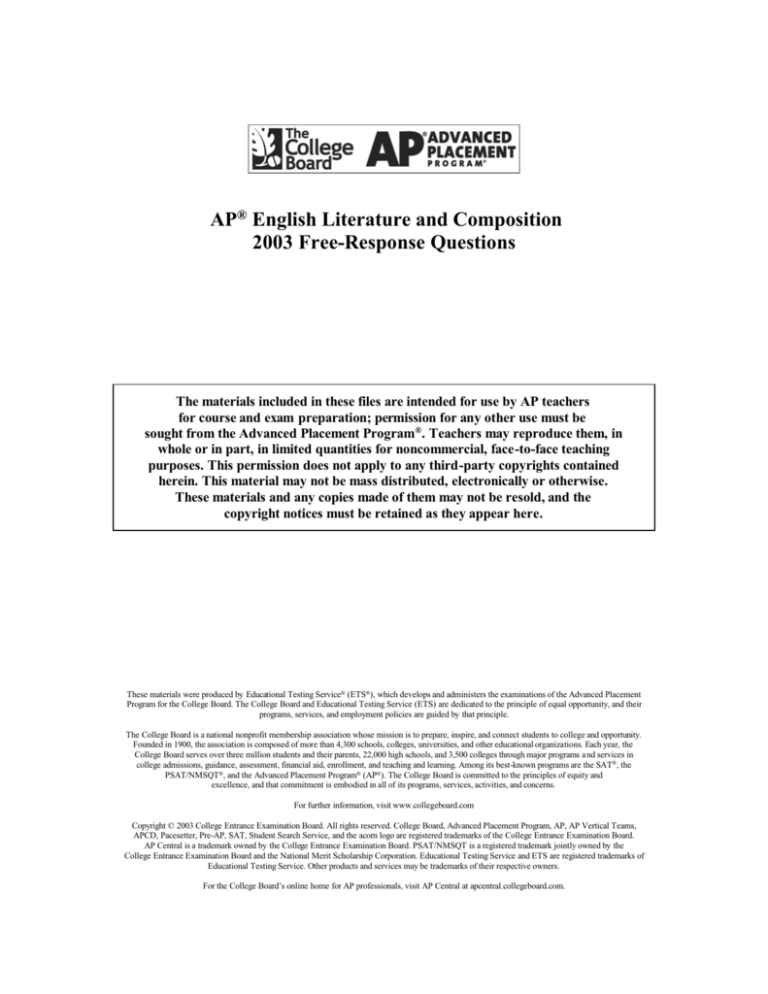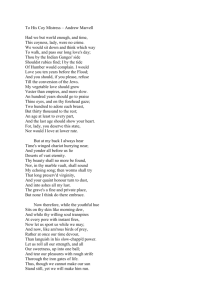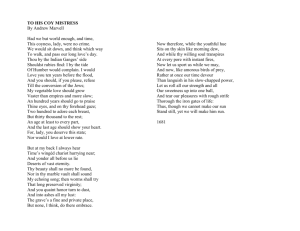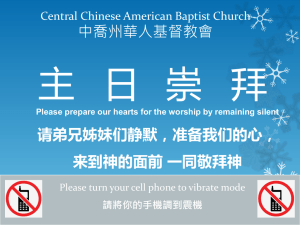
AP® English Literature and Composition
2003 Free-Response Questions
The materials included in these files are intended for use by AP teachers
for course and exam preparation; permission for any other use must be
sought from the Advanced Placement Program®. Teachers may reproduce them, in
whole or in part, in limited quantities for noncommercial, face-to-face teaching
purposes. This permission does not apply to any third-party copyrights contained
herein. This material may not be mass distributed, electronically or otherwise.
These materials and any copies made of them may not be resold, and the
copyright notices must be retained as they appear here.
These materials were produced by Educational Testing Service® (ETS®), which develops and administers the examinations of the Advanced Placement
Program for the College Board. The College Board and Educational Testing Service (ETS) are dedicated to the principle of equal opportunity, and their
programs, services, and employment policies are guided by that principle.
The College Board is a national nonprofit membership association whose mission is to prepare, inspire, and connect students to college and opportunity.
Founded in 1900, the association is composed of more than 4,300 schools, colleges, universities, and other educational organizations. Each year, the
College Board serves over three million students and their parents, 22,000 high schools, and 3,500 colleges through major programs and services in
college admissions, guidance, assessment, financial aid, enrollment, and teaching and learning. Among its best-known programs are the SAT®, the
PSAT/NMSQT®, and the Advanced Placement Program® (AP®). The College Board is committed to the principles of equity and
excellence, and that commitment is embodied in all of its programs, services, activities, and concerns.
For further information, visit www.collegeboard.com
Copyright © 2003 College Entrance Examination Board. All rights reserved. College Board, Advanced Placement Program, AP, AP Vertical Teams,
APCD, Pacesetter, Pre-AP, SAT, Student Search Service, and the acorn logo are registered trademarks of the College Entrance Examination Board.
AP Central is a trademark owned by the College Entrance Examination Board. PSAT/NMSQT is a registered trademark jointly owned by the
College Entrance Examination Board and the National Merit Scholarship Corporation. Educational Testing Service and ETS are registered trademarks of
Educational Testing Service. Other products and services may be trademarks of their respective owners.
For the College Board’s online home for AP professionals, visit AP Central at apcentral.collegeboard.com.
2003 AP® ENGLISH LITERATURE AND COMPOSITION
FREE-RESPONSE QUESTIONS
ENGLISH LITERATURE AND COMPOSITION
SECTION II
Total time—2 hours
Question 1
(Suggested time— 40 minutes. This question counts as one-third of the total essay section score.)
The following poems are both concerned with Eros, the god of love in Greek mythology. Read the poems carefully.
Then write an essay in which you compare and contrast the two concepts of Eros and analyze the techniques used to
create them.
EPWS1
Line
5
10
15
20
25
Eros
Why hast thou nothing in thy face?
Thou idol of the human race,
Thou tyrant of the human heart,
The flower of lovely youth that art;
Yea, and that standest in thy youth
An image of eternal Truth,
With thy exuberant flesh so fair,
That only Pheidias2 might compare,
Ere from his chaste marmoreal3 form
Time had decayed the colours warm;
Like to his gods in thy proud dress,
Thy starry sheen of nakedness.
Surely thy body is thy mind,
For in thy face is nought to find,
Only thy soft unchristen’d smile,
That shadows neither love nor guile,
But shameless will and power immense,
In secret sensuous innocence.
O king of joy, what is thy thought?
I dream thou knowest it is nought,
And wouldst in darkness come, but thou
Makest the light where’er thou go.
Ah yet no victim of thy grace,
None who e’er long’d for thy embrace,
Hath cared to look upon thy face.
Line
5
10
15
20
I call for love
But help me, who arrives?
This thug with broken nose
And squinty eyes.
‘Eros, my bully boy,
Can this be you,
With boxer lips
And patchy wings askew?’
‘Madam,’ cries Eros,
‘Know the brute you see
Is what long overuse
Has made of me.
My face that so offends you
Is the sum
Of blows your lust delivered
One by one.
We slaves who are immortal
Gloss your fate
And are the archetypes
That you create.
Better my battered visage,
Bruised but hot,
Than love dissolved in loss
Or left to rot.’
—Anne Stevenson (1990)
—Robert Bridges (1899)
Anne Stevenson, Collected Poems
1955-1995, Bloodaxe Books, 2000.
1 Eros (in Greek)
2 Greek sculptor of the fifth century B.C.
3 marble
Copyright © 2003 by College Entrance Examination Board. All rights reserved.
Available to AP professionals at apcentral.collegeboard.com and to
students and parents at www.collegeboard.com/apstudents.
GO ON TO THE NEXT PAGE.
2
2003 AP® ENGLISH LITERATURE AND COMPOSITION
FREE-RESPONSE QUESTIONS
Question 2
(Suggested time— 40 minutes. This question counts as one-third of the total essay section score.)
The following passage is an excerpt from “The Other Paris,” a short story by the Canadian writer Mavis Gallant.
Read the passage carefully. Then, in a well-written essay, explain how the author uses narrative voice and
characterization to provide social commentary.
Line
5
10
15
20
25
30
35
40
If anyone had asked Carol at what precise moment
she fell in love, or where Howard Mitchell proposed
to her, she would have imagined, quite sincerely, a
scene that involved all at once the Seine, moonlight,
barrows of violets, acacias in flower, and a confused,
misty background of the Eiffel tower and little
crooked streets. This was what everyone expected,
and she had nearly come to believe it herself.
Actually, he had proposed at lunch, over a tuna-fish
salad. He and Carol had known each other less than
three weeks, and their conversation, until then, had
been limited to their office—an American government agency—and the people in it. Carol was twentytwo; no one had proposed to her before, except an
unsuitable medical student with no money and eight
years’ training still to go. She was under the illusion
that in a short time she would be so old no one would
ask her again. She accepted at once, and Howard
celebrated by ordering an extra bottle of wine. Both
would have liked champagne, as a more emphatic
symbol of the unusual, but each was too diffident to
suggest it.
The fact that Carol was not in love with Howard
Mitchell did not dismay her in the least. From a series
of helpful college lectures on marriage she had
learned that a common interest, such as a liking for
Irish setters, was the true basis for happiness, and that
the illusion of love was a blight imposed by the film
industry, and almost entirely responsible for the high
rate of divorce. Similar economic backgrounds,
financial security, belonging to the same church—
these were the pillars of the married union. By an
astonishing coincidence, the fathers of Carol and
Howard were both attorneys and both had been
defeated in their one attempt to get elected a judge.
Carol and Howard were both vaguely Protestant,
although a serious discussion of religious beliefs
would have gravely embarrassed them. And Howard,
best of all, was sober, old enough to know his own
mind, and absolutely reliable. He was an economist
who had sense enough to attach himself to a corporation that continued to pay his salary during his loan to
the government. There was no reason for the
engagement or the marriage to fail.
45
50
55
60
65
70
75
Carol, with great efficiency, nearly at once set
about the business of falling in love. Love required
only the right conditions, like a geranium. It would
wither exposed to bad weather or in dismal surroundings; indeed, Carol rated the chances of love in a
cottage or a furnished room at zero. Given a good
climate, enough money, and a pair of good-natured,
intelligent (her college lectures had stressed this)
people, one had only to sit back and watch it grow.
All winter, then, she looked for these right conditions
in Paris. When, at first, nothing happened, she blamed
it on the weather. She was often convinced she would
fall deeply in love with Howard if only it would stop
raining. Undaunted, she waited for better times.
Howard had no notion of any of this. His sudden
proposal to Carol had been quite out of character—
he was uncommonly cautious—and he alternated
between a state of numbness and a state of selfcongratulation. Before his engagement he had
sometimes been lonely, a malaise he put down to
overwork, and he was discontented with his bachelor
households, for he did not enjoy collecting old pottery
or making little casserole dishes. Unless he stumbled
on a competent housemaid, nothing ever got done.
This in itself would not have spurred him into
marriage had he not been seriously unsettled by the
visit of one of his sisters, who advised him to marry
some nice girl before it was too late. “Soon,” she told
him, “you’ll just be a person who fills in at dinner.”
Howard saw the picture at once, and was deeply
moved by it.
(1953)
Copyright © 2003 by College Entrance Examination Board. All rights reserved.
Available to AP professionals at apcentral.collegeboard.com and to
students and parents at www.collegeboard.com/apstudents.
GO ON TO THE NEXT PAGE.
3
2003 AP® ENGLISH LITERATURE AND COMPOSITION
FREE-RESPONSE QUESTIONS
Question 3
(Suggested time— 40 minutes. This question counts as one-third of the total essay section score.)
According to critic Northrop Frye, “Tragic heroes are so much the highest points in their human landscape that they
seem the inevitable conductors of the power about them, great trees more likely to be struck by lightning than a
clump of grass. Conductors may of course be instruments as well as victims of the divine lightning.”
Select a novel or play in which a tragic figure functions as an instrument of the suffering of others. Then write an
essay in which you explain how the suffering brought upon others by that figure contributes to the tragic vision of
the work as a whole.
You may choose a work from the list below or another novel or play of comparable quality. Avoid mere plot
summary.
An American Tragedy
Anna Karenina
Antigone
Beloved
Crime and Punishment
Death of a Salesman
Ethan Frome
Faust
Fences
For Whom the Bell Tolls
Frankenstein
Hedda Gabler
King Lear
Light in August
Long Day’s Journey into Night
Lord Jim
Macbeth
Medea
Moby-Dick
Oedipus Rex
Phèdre
Ragtime
Sent for You Yesterday
Tess of the D’Urbervilles
Things Fall Apart
END OF EXAMINATION
Copyright © 2003 by College Entrance Examination Board. All rights reserved.
Available to AP professionals at apcentral.collegeboard.com and to
students and parents at www.collegeboard.com/apstudents.
4








